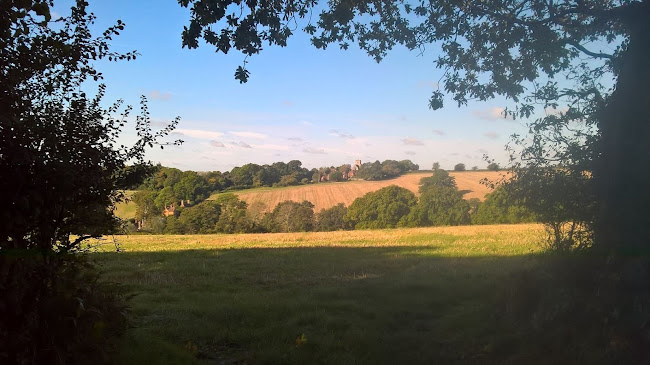"The New England Primer was the first textbook printed in America and it taught the letters of the alphabet by short poems. Here's the first, teaching the letter A:
In Adam's fall,
We sinned all."
Tim Bayly, Daddy Tried: Overcoming the Failures of Fatherhood (Warhorn Media, 2016) p26
Wednesday, April 24, 2019
Sunday, April 21, 2019
Acts 10:34-43 Easter Sunday Handout
Because everyone wants a 5 point sermon for Easter Sunday, not just merry japes with chocolate eggs.
RESURRECTION
REVERSAL:
THE EASTER
COMEBACK PROCLAIMED
Acts
10:34-43 (p1104)
The greatest comeback in history?
A remarkable reversal
Guest preacher: The
Apostle Peter – the denier transformed!
Summary:
“The good news of peace through Jesus
Christ, who is Lord of all” (v36)
(1)
What Jesus did: Jesus the Messiah did good and healed (vv37-38)
(2)
What the people did: they killed Jesus on a cross (v39)
(3)
What God did: raised him from the dead and caused him to be seen (v40)
(4)
What the Apostles are doing: proclaiming and testifying as eye-witnesses
(v41-42)
The New Testament message Jesus commanded the
apostles to preach (v42):
The Old Testament message of the prophets
(v43):
(5)
What all people must do: believe in Jesus (v43)
Wednesday, April 17, 2019
Cups in the Bible
At this year's Maundy Thursday Communion, I am hoping to tell the story of Easter as the tale of two cups: the cup of God's wrath which Jesus accepts in the Garden and the cup of salvation and blessing which Jesus offers his disciples in the Upper Room.
In addition to these two passages, here is some of the biblical data on "cups" which contributes to the background:
Negatively:
In addition to these two passages, here is some of the biblical data on "cups" which contributes to the background:
Negatively:
Ps 75:8 – The Lord makes
the wicked drink a cup of foaming wine mixed with spices down to the very dregs
Is 51:17-23 – Jerusalem is
told that she has drunk to the dregs from the cup of God’s wrath and been made
drunk, and caused to stagger, and now God will give this cup to their
oppressors
Jer 25:15-29 – The cup of
God’s wrath that makes people stagger.
The nations are going to be
forced to drink from it so much that they vomit and fall to rise no more.
Lam 4:21 – Edom and Uz
will be passed the cup and be drunk and stripped naked
Ez 23:31-34 – God’s people
will be made to drink a large and deep cup which holds so much that it brings
scorn and derision, drunkenness, ruin, sorrow and desolation.
And positively:
Ps 16:5 – The Lord himself is the Psalmist's pleasant portion and cup.
In Psalm 23, the Lord prepares a feast for his servant and his cup overflows. (v5)
In Psalm 116, in gratitude for his deliverance, the Psalmist says:
“I will lift up the cup of
salvation and call on the name of the Lord.” (v13)
In 1 Cor 10, Paul speaks
of the cup of blessing which we bless in the Communion service as a participation
in the blood of Christ. (v16)
Sunday, April 07, 2019
Parish Magazine Item
From The Rectory
Obviously,
I would like you to come to your parish church, well, pretty much every week,
unless you are really infectious or otherwise unavoidably prevented from doing
so. But if you do miss a week, you can normally catch up on sermons on the
Warbleton Church website, here: warbletonchurch.org.uk/sermons-talks
A
poor substitute would be to read a little summary or a copy of the handout in the
parish magazine, but in case you missed this particular week and haven’t caught
up online, or as a helpful reminder, here are some jottings on Psalm 126, which
was the Psalm appointed for Sunday 7th April (today as I write), The
Fifth Sunday of Lent, in the Church of England’s Lectionary.
Psalm 126 (page 623 in the Bibles in the pews at church)
Sorrow & Singing
[To
get maximum benefit from this, you should now read Psalm 126 and keep it open
before you. I suggest The New International Version, which we use in church and
which you can easily find online but there are lots of other good modern
translations available]
How
do you feel? Really? Almost always there are reasons for both sadness (v1,
vv4-6) and / or happiness (vv2-3, vv5-6), which we can also see in the Psalm.
(1) REMEMBER with
gratitude that God restored his people in the past (vv1-3)
Verses
1 and 4 speak maybe of a captivity (literal or metaphorical?) or of some other
kind of restoration. It is as if God saved the people while they were asleep!
He did it for them without their help. They awoke from their nightmare and had
to pinch themselves. It was like a dream come true!
Likely
the Psalmist is looking back to The Exodus when the people stood and watched as
God saved them from slavery in Egypt. Possibly he is thinking of the return
from exile in Babylon. We would think of the death and resurrection of Jesus,
when he redeemed and set free all who trust in him.
AND SO, because of what
God has done in the past, we should:
(2) PRAY with
confidence that God would restore
his people in the future (vv4-6)
The
“Negev” (v4) means “dry” / “barren”. It was the southern desert region towards
Sinai. When heavy rains fell in the mountains, streams would appear in the Negev.
Although a natural phenomenon, this seemed like a sudden “act of God”, like a
miracle. The waters brought new life and dramatic transformation, sometimes
overnight. We have probably seen that kind of thing on nature programmes on the
telly, as the desert blooms.
Sowing
(vv5-6) is a bit different. It involves planning and investment, hard work and slow
long-term hope. God could of course restore us suddenly and without us doing a
thing. But he may want us to pray and act. Although the people of Israel did
not save themselves from slavery in Egypt and never could, they did at least have
to walk through the waters as the Red Sea parted.
We
should commit our fortunes, and those of our family, community, nation, world
and church to the Lord. But this Psalm finds its ultimate fulfilment in the resurrection
hope of heaven and The New Creation. Our lives may involve many sadnesses and
tears, but we can know that the end of the story is a joyful harvest. Jesus is like
the first fruits of the resurrection. Or the first bluebell of spring. Jesus
Christ is risen indeed! And so the resurrection is coming! That is a solid
basis for gratitude and confidence.
The Revd Marc Lloyd
Psalm 126 - various outlines / headings
Motyer, Psalms by the Day:
Tension. Now and not yet: laughter and tears
Joy: what Yahweh has done (vv1-3)
Longing: what Yahweh will yet do – prayer and
answer (vv4-6)
* * *
Motyer, Journey: Psalms for Pilgrim People
Instant
coffee and stalactites: Living with God’s tensions
Satan, the idealist
Past and present
A1 (v1) Restoration
(a) The work of the Lord
(b) His sole work, without human contribution
B1 (v2) Voices in response
(a) The vocal joy of the recipients
(b) The observing world
A2 (vv3-4) Restoration
(a) Joy in what the Lord has done (v3)
(b) Prayer for more of the same (v4)
B2 (vv5-6) Another voice: A promise doubled
(a) Tears and joy, sorrow and reaping
(b) Weeping and joy, seed and sheaves
Miracle and providence
Praying for more
Waiting for miracle, living with providence
Instant coffee and stalactites
* * *
Kidner:
“It was like a dream!”
Joy re-lived (vv1-3)
Joy re-claimed (vv4-6)
* * *
Wilcock:
Something clear (restoration, vv1, 4),
something obscure (but how are the two halves of the Psalm related?)
Something quick (flood), something slow
(farming)
* * *
Goldingay,
Weeping and Laughter
Vv1-3, The recollection
Vv4-6, The prayer built on the recollection
* * *
The Expositor’s Bible Commentary:
The restoration is here!
Joy of God’s people (vv1-2a)
Proclamation among the nations (v2b)
Thanksgiving (v3)
Prayer (v4)
Assurance of prayer answered (vv5-6)
* * *
Spurgeon,
Leading captivity captive
A narrative (vv1-2)
A song (v3)
A prayer (v4)
A promise (v5)
Psalm 126 - a handout
Psalm 126 (page 623)
Sorrow &
Singing
How do you feel?
Sadness (v1, vv4-6) and /
or Happiness? (vv2-3, vv5-6)
(1) REMEMBER with gratitude that God restored
his people in the past (vv1-3)
Vv1, 4 – captivity
(literal or metaphorical?)? / restoration?
V1 – It is as if God did
it (for us) while we were asleep!
We had to pinch ourselves!
It was like a dream come true!
The Exodus – the people
stood and watched as God saved them!
The return from exile in
Babylon?
The death and resurrection
of Jesus
The logical connection
between (1) and (2): AND SO…
(2) PRAY with confidence that God
would restore his people in the future (vv4-6)
The “Negev” (v4) – means
“dry” / “barren” – the southern desert region towards Sinai
“streams in the Negev”
(v4) – a sudden “act of God”, like a miracle, new life, dramatic transformation
Sowing (vv5-6) – hard
work, slow long-term hope
The resurrection hope of
heaven and The New Creation
Subscribe to:
Posts (Atom)




